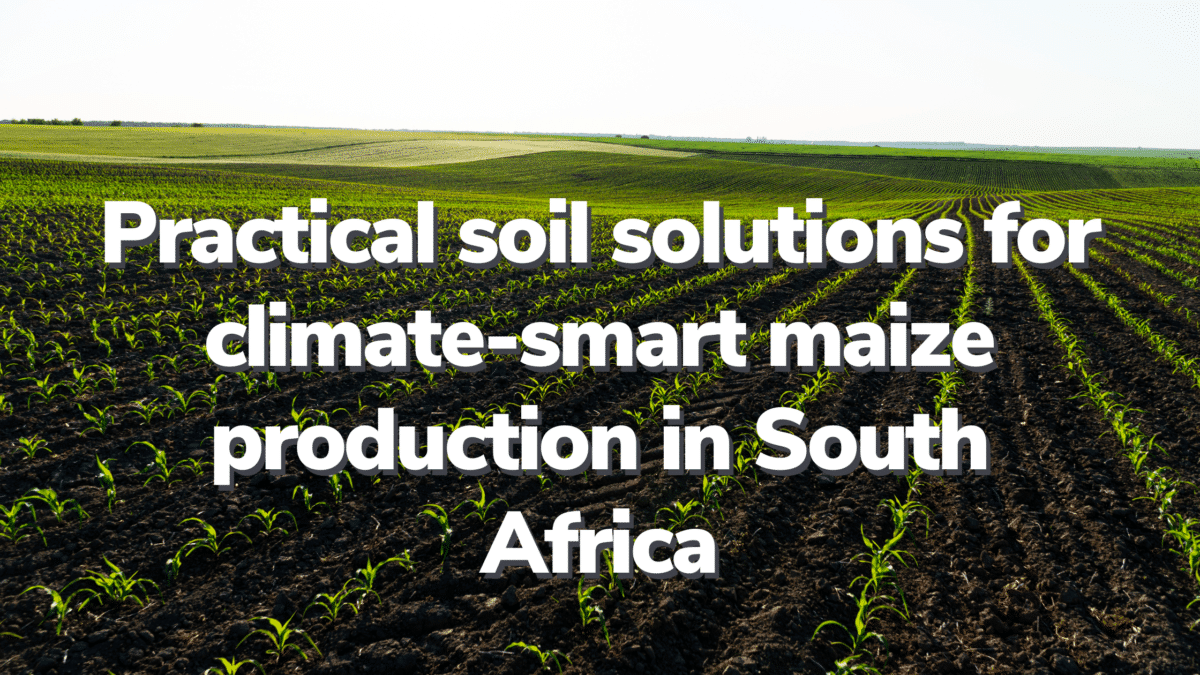As extreme weather events grow more common, South African farmers face a pressing challenge: producing high-yield maize crops while keeping soil healthy and resilient. In this context, sustainable agriculture practices have become critical to the survival and profitability of grain farmers in South Africa. Cultivating maize while keeping soil healthy and resilient demands more than traditional fertilisation; it requires integrated soil health strategies that simultaneously protect our environment and build resilience against climate variability.
The carbon-sequestering power of healthy soil
Healthy soils act as a crucial carbon sink, absorbing and storing carbon dioxide (CO₂) from the atmosphere. In fact, soil contains approximately 80% of terrestrial carbon sinks, making it the second-largest carbon pool on Earth (after oceans). This remarkable capacity underscores why the United Nations and climate experts emphasise sustainable soil management as essential for climate resilience. Healthy, carbon-rich soils not only help slow down climate change but also enhance soil structure and fertility, which are essential for crops like maize to thrive.
When farmers use soil-friendly, low-carbon products, they help replenish this natural carbon sink, promoting regenerative agriculture—a farming approach focused on rebuilding soil organic matter and restoring degraded soil biodiversity. Integrating biostimulants and organic soil inputs can lead to greater carbon retention in soil, improving its overall health and reducing reliance on synthetic inputs that often leave a larger carbon footprint.
Soil health and climate resilience go hand in hand
Studies across Southern Africa have shown that sustainable practices yield impressive benefits:
CGIAR’s Research Program on Maize shows that conservation agriculture reduces farmer vulnerability to climate risks throughout southern Africa. Farmer adoption of conservation agriculture in Malawi, Zambia and Zimbabwe shows yield benefits of 30% to 50% (up to 140%) under drought conditions.
In Southern Africa, this is a game-changer, as climate variability becomes increasingly challenging for farmers. Maintaining soil moisture and structure are essential for maize. A study found that when soil moisture levels were stable, maize exhibited better root activity and overall growth, leading to higher yields compared to fluctuating moisture conditions. Specifically, stable soil moisture reduced water stress in maize, which is crucial for its development and productivity. Healthier plants not only produce better yields but also reduce dependency on pesticides, further minimising environmental impact.
So, how can maize farmers start improving soil health and their carbon footprints?
Implementing agroecological practices for maize cultivation
For grain farmers, adopting agroecological practices is one of the most effective ways to enhance soil health with minimal environmental impact. Integrating low-footprint biofertilisers as part of a holistic soil management program complements practices such as crop rotation, cover cropping, and reduced tillage. Together, these techniques promote biodiversity, prevent soil degradation, and sustain fertility over the long term.
Zylem is pioneering low-carbon agricultural inputs that directly support regenerative practices. Our product, SeaBrix™, is the country’s first to undergo a full carbon life cycle assessment (LCA), offering farmers transparency in reducing carbon emissions and enhancing soil health. The results of the LCA are available from alexp@zylemsa.co.za.
With insights gained from the assessment, Zylem is refining its production processes to minimise emissions. For farmers, this means that using SeaBrix™ supports regenerative agriculture in a quantifiable way, with a product that contributes to soil health and carbon sequestration on the farm while embodying low-emission manufacturing principles.
Maize farmers can’t afford to ignore soil health
“As farmers look for ways to keep yields high while limiting environmental impact, biostimulants like SeaBrix™ represent a modern solution grounded in sustainable, practical soil management principles,” says Alex Platt, Business Development Manager at Zylem, “It offers a forward-thinking, low-impact option for farmers who are ready to adopt regenerative practices without sacrificing productivity. With tools like these, maize growers in South Africa can continue to cultivate high-quality crops that feed communities, enrich soils, and contribute to a healthier planet.”

